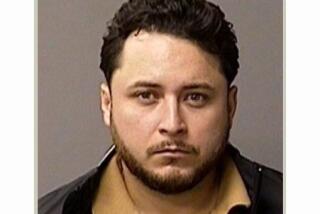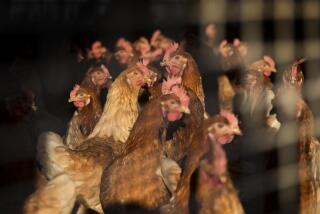Feds nab raw-milk cheese in food safety case
Federal prosecutors in Central California have busted outlaws they describe as pale-skinned and somewhat smelly, with mug shots worthy of Bon Appetit: 97 wedges of raw-milk Gouda cheese.
On Thursday, U.S. marshals and Food and Drug Administration agents arrived at Tulare County cheese maker Bravo Farms and seized the Gouda, along with piles of Edam and blocks of white cheddar. All told, investigators have locked up more than 80,000 pounds of cheese. Prosecutors say it is all headed for the garbage disposal.
The seizure came in the wake of a recall last year of Bravo Farms Dutch-style Gouda, which was linked to an E. coli O157:H7 outbreak late last year in California and four other states. Sold primarily at Costco and Whole Foods Market stores, the Gouda was pulled from shelves in November after it was connected to 38 people becoming ill. One person suffered acute kidney failure.
The artisan cheese maker, based in Traver, Calif., temporarily shut down. Federal and state officials sampled Bravo’s quarantined stockpiles, some of which tested positive for E. coli and Listeria monocytogenes, a pathogen that can be fatal to children and the elderly, according to federal court documents and an FDA inspection report.
Worried that the cheese would somehow reach the public, and acting to shift the case from state to federal jurisdiction, the Justice Department used a civil legal mechanism to seize a product — food — and essentially impound it. Prosecutors filed a civil complaint in federal court in Sacramento last week that lists the cheese — not the farmers who made it — as defendants.
Then, Thursday morning, federal agents pulled up to the cheese shop, tamper-proof tape in hand.
The case is the latest salvo in a heated regulatory food fight. On one side are government regulators who say they are simply enforcing rules designed to protect consumers from unsafe foods and to provide a level playing field for producers both big and small. On the other side are so-called locavores, people who believe small producers routinely make food that is more healthful and safer than large-scale corporations. They are joined by outraged foodies, whose palates and wallets are feeding the farmstead industry: cheese makers who use centuries-old techniques and the milk from their own dairy cows to turn out products that sell for $25 a pound and more.
Some producers say raw milk gives their cheese a more complex flavor. Federal law requires such unpasteurized cheese to be aged for at least 60 days to kill off potentially dangerous bacteria.
Demand for all manner of raw foods has been growing, and raw milk in particular has drawn a lot of regulatory focus in recent years, largely because the politically powerful dairy industry has pressed the government to act. That scrutiny has broadened to unpasteurized cheese.
In April, the FDA started inspecting small and medium-sized producers, some with products sold in high-end restaurants and grocery stores. The FDA is testing for listeria, for which the federal government has a zero-tolerance policy in ready-to-eat products.
John Sheehan, director of the FDA’s dairy division, said the inspections came from concerns “about raw-milk cheese made under artisanal conditions” and a flurry of nine artisan cheese recalls last year. As of October, the FDA had inspected 102 facilities, some big, some small. Of the 147 samples taken, 32 tested positive for listeria. The inspections continue.
The Bravo case started with the recall, not an inspection. Founder Bill Boersma, a third-generation dairyman, became one of the state’s first artisan cheese makers in 1995. As the years passed, fans flocked to Traver, a hamlet about 28 miles southwest of Fresno, to sit on tractor-seat bar stools and watch the cheese being made.
Bravo voluntarily recalled its Dutch Style Gouda on Nov. 5. Bravo co-owner Jonathan Van Ryn said the company still didn’t know what caused the problem. “We’ve gone through our manufacturing practices and increased safety precautions dramatically,” he said.
State and federal investigators found at least 50 live flies flitting around a processing area at Bravo. They also reported that a rabbit hopped out of a storage room, and a dairy worker scratched his chin then handled milled cheese with his bare hands.
Of the 24 unpasteurized cheese samples investigators took, 15 tested positive for listeria and one tested positive for E. coli O157:H7.
“It shows that even a mild contamination can still cause a severe outbreak,” said William Marler, a Seattle-based food safety lawyer who is representing 11 people who became ill after eating the recalled Gouda.
Bravo, which is cooperating with federal officials, has been cleared to make cheese again. It’s using pasteurized milk.






